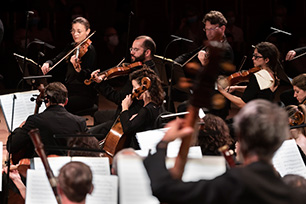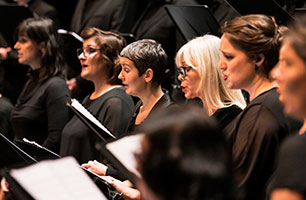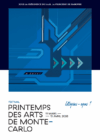On 11th March 1829, in Berlin, 20-year-old Felix Mendelssohn revealed Bach’s long-forgotten St Matthew Passion to the ears of King Frederick William III, Hegel, Heine, and other luminaries. The event attracted a thousand listeners at the Berliner Singakademie, which lead to another performance on 21st March, Bach’s birth date, and a third on Good Friday, given by his teacher Zelter. Mendelssohn noticed that the highest Christian music is revived by a Jew (himself, although converted to Lutheranism at the age of seven) and an actor (Devrient, the voice of Christ).
After this feat, Mendelssohn started on a European “grand tour”, during which he heard the Palestrina polyphony in Rome. From his fertile early years at the Singakademie to the late commissions from the King of Prussia for the Berlin Cathedral, Mendelssohn composed a large number of motets and cantatas, in German or Latin, a cappella or with accompaniment, several of which are presented tonight.
Mendelssohn’s sacred music was, as it were, circumscribed to the Easter season, from the Bachian Matthäuspassion in 1829 to his Christus in 1847. But while Paulus and then Elias, oratorios based on the New and Old Testaments, came in a single inspiration, the composer struggled with Christus. Instead of being the apotheosis of his oratorio trilogy and of the Mendelssohn’s Judeo-Christian “family novel” (Freud), Christus would remain unfinished.
Certainly, the sudden death in May 1847 of his beloved sister Fanny, herself a composer – whom he would join six months later in the grave – contributed to the exhaustion of the gifted musician who led three lives in one (Berlin, Leipzig, London). But something else may have hindered him. For, despite his extreme despondency, Felix still accumulated masterpieces, including the String Quartet in F minor, also known as “Requiem for Fanny”. If the grandson of the great Jewish philosopher of the Aufklärung, Moses Mendelssohn, was unable to complete Christus, could it be that “mysterious barricades” prevented him from glorifying the Lord Jesus Christ?
Following the model of Handel’s Messiah, the end-less and nameless oratorio – Christus is the posthumous title given by his brother Paul – is divided into three parts: Birth of Christ; Passion of Christ; Resurrection of Christ and propagation of the Christian faith. Only a few numbers of unequal length are set to music: narrations by the tenor-narrator, brief choruses of the turba (the people) and chorales, to the exclusion of arias (thus the vocal incarnation of Christ) and large choirs. It is as though Mendelssohn’s thinking was closer to the divine than to the Christian, and that he could not ultimately assume the role of a herald reconciling Judaism and Christianity, the two faiths that moulded him.
A West German, less divided than Mendelssohn, Wolfgang Rihm was, like his elder, captivated from his adolescence by this crucial moment of Christian spirituality. In the turmoil of 1968, he composed five short Fragmenta Passionis, motets for mixed a cappella choir, of which “Da schrien alle” is the expressionist moment – in Schönbergian sprechgesang (spoken-sung) – where the people, going from murmur to cry, demand the crucifixion of Jesus: “Kreuzige, kreuzige, ihn!” Rihm would focus again on the time of the Passion with his vast Deus Passus and the intense Sieben Passions-Text.
Enthusiastic echoes of the resurrection of the Matthäuspassion in 1829 had reached the old Goethe in Weimar. So when his protégé stopped in Weimar for the last time on his way to the “great tour”, the mentor offered him a fantastic ballad which immediately excited the musical imagination of the disciple. In permanent connection with the supernatural, Mendelssohn is the author of two famous Nights, praised by Berlioz and Liszt: A Midsummer Night’s Dream after Shakespeare and The First Walpurgis Night after Goethe’s ballad. With Walpurgis for soloists, choir and orchestra, the young composer inaugurated in 1831 a “new kind of cantata”. He then revised it thoroughly in 1843 to make it a masterpiece worthy of marking the millennium of Germania.
Here we are again in March with the orchestral overture that evokes the passage from winter to spring. This is followed by nine interlinked numbers that tell of the rites of the druids and their followers during the night of 1st May on Mount Brocken in the Harz, as the new Christians, ridiculed by Goethe, try to prevent them. The masterfully crafted Mendelssohnian nocturnal phantasmagoria culminates in the central numbers. While No. 8 for the Christians is not given such treatment, Nos. 7 and 9 featuring the ancient believers are paradoxically given a liturgical theme and end in a victorious C major for “And if our ancient beliefs were stolen / Who could steal your light from us?”
Ambiguous in the extreme for a convert, Goethe’s anti-Christian – or rather anti-intolerance – charge reveals the complex depth of Mendelssohn the scholar, and the admirable syncretism of his art.
Brigitte François-Sappey




